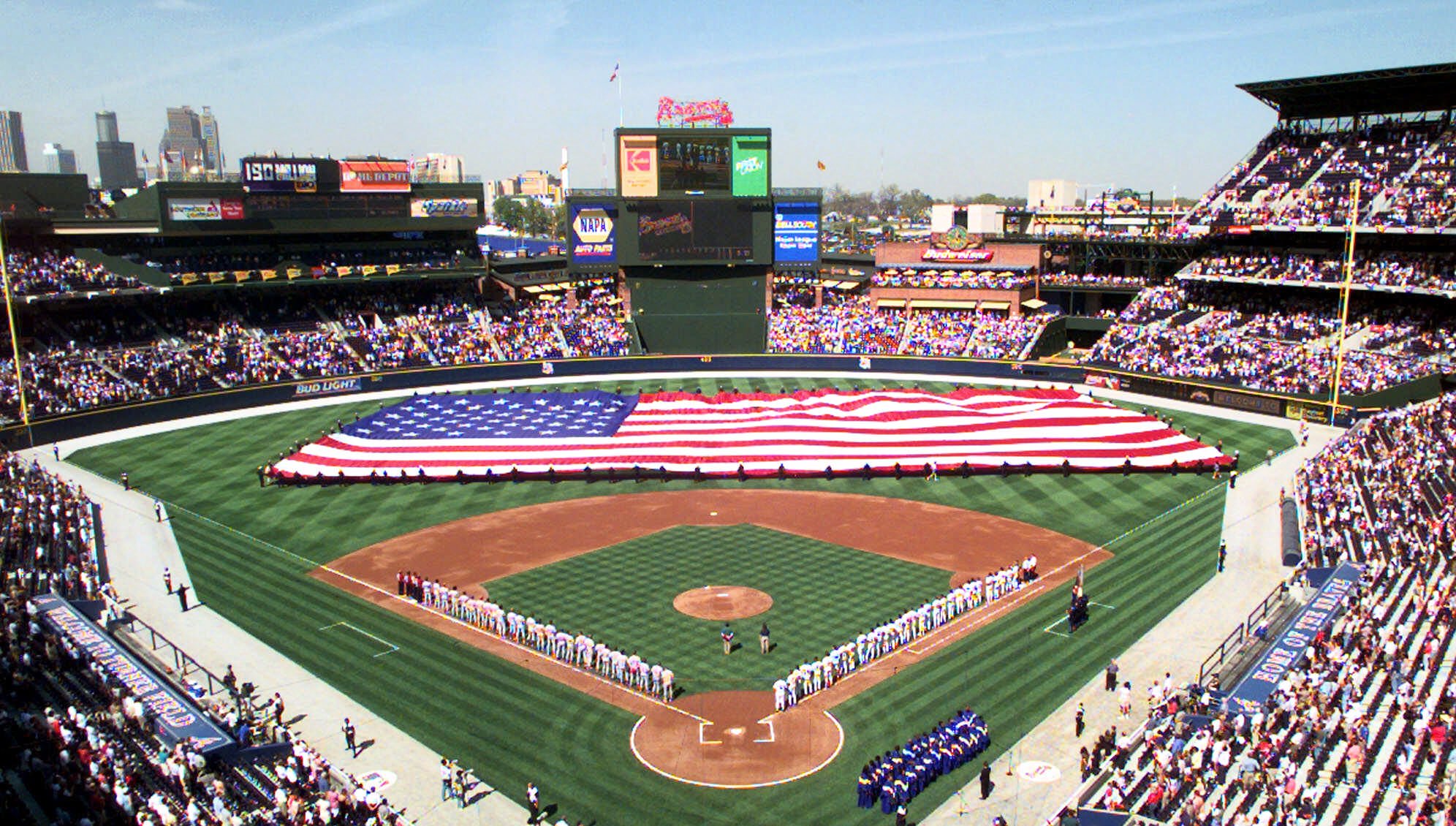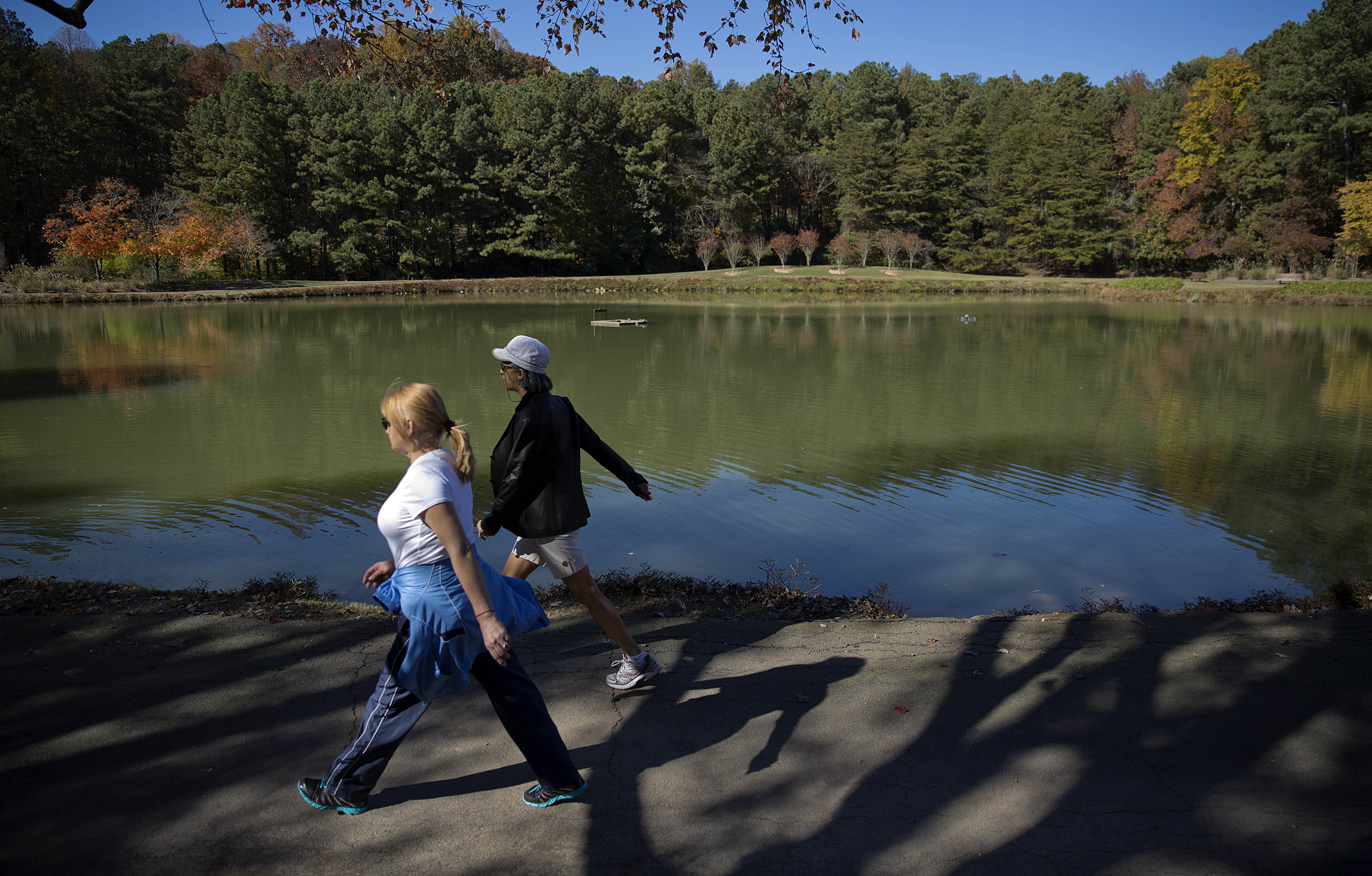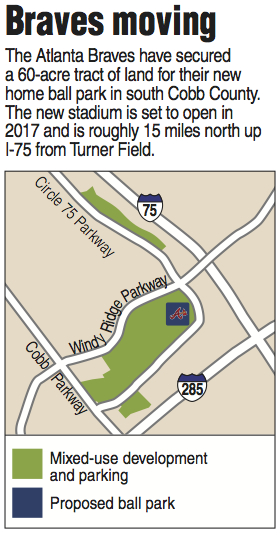 The Atlanta Braves, right, and the Philadelphia Phillies line the base paths as a giant American flag is stretched across the outfield while the national anthem is played before the start of their opening-day game in Atlanta. The Atlanta Braves are leaving Turner Field and moving into a new 42,000-seat, $672 million stadium complex in Cobb County in 2017. Braves executives John Schuerholz, Mike Plant and Derek Schiller said Monday, that the team decided not to seek another 20-year lease at Turner Field and began talks with the Cobb Marietta Coliseum and Exhibit Hall Authority in July.
The Atlanta Braves, right, and the Philadelphia Phillies line the base paths as a giant American flag is stretched across the outfield while the national anthem is played before the start of their opening-day game in Atlanta. The Atlanta Braves are leaving Turner Field and moving into a new 42,000-seat, $672 million stadium complex in Cobb County in 2017. Braves executives John Schuerholz, Mike Plant and Derek Schiller said Monday, that the team decided not to seek another 20-year lease at Turner Field and began talks with the Cobb Marietta Coliseum and Exhibit Hall Authority in July.PUBLIC MONEY AND STADIUMS
AT&T Field, the home of the Chattanooga Lookouts, was built in 2000 in the downtown area near the Tennessee Aquarium.Lookouts owner Frank Burke privately financed the facility and did not receive public money.The new Atlanta Braves stadium and complex will reportedly receive $450 million from Cobb County to move outside Atlanta, which the Braves have called home since moving from Milwaukee in 1966.Nashville Mayor Karl Dean recently said his city should contribute $65 million to the proposed $150 million construction effort to build the minor league Sounds a new downtown ball park.
 Walkers pass along an area where a new stadium will be built for the Atlanta Braves baseball team. The Braves announced Monday they are leaving Turner Field and moving into a new 42,000-seat, $672 million stadium about 10 miles from downtown in 2017. Atlanta's mayor said the city wasn't willing to match an offer from suburban Cobb County worth $450 million in taxpayer funding.
Walkers pass along an area where a new stadium will be built for the Atlanta Braves baseball team. The Braves announced Monday they are leaving Turner Field and moving into a new 42,000-seat, $672 million stadium about 10 miles from downtown in 2017. Atlanta's mayor said the city wasn't willing to match an offer from suburban Cobb County worth $450 million in taxpayer funding.ATLANTA - Turner Field had a signature event right at the start -- a trembling Muhammad Ali emerging from the shadows to ignite the flame that opened the 1996 Summer Olympics. In the years that followed, the Atlanta Braves hosted many memorable moments of their own, from a World Series and All-Star Game to the farewells of Bobby Cox and Chipper Jones.
Now, just 17 years after it opened, it looks as though the stadium affectionately known as "the Ted" is headed for extinction, like so many sports facilities in this city.
In a stunning announcement, the Braves said Monday they are moving to a new 42,000-seat, $672 million stadium about 10 miles from downtown in suburban Cobb County, apparently swayed by a lucrative financial package that was just too good to pass up.
Mayor Kasim Reed said the city couldn't match a $450 million offer from one of Atlanta's sprawling northern suburbs, though it wasn't immediately clear how the county of some 700,000 people plans to raise the money or whether it will require a vote of the taxpayers.
Mike Plant, the Braves executive vice president of business operations, said the team has not signed a contract with Cobb County, but he's "100 percent certain it will happen."
Until now, Cobb County was perhaps best-known nationally as the base of former House speaker Newt Gingrich and for passing an anti-gay ordinance in the 1990s that led the Olympic organizing committee to abandon plans to hold events there during the Atlanta Games.
In 2017, it will become the home of the Braves.
"It was with mixed emotions that we made this decision," team President John Schuerholz said. "The new stadium, we believe, will be one of the most magnificent ever built."
The Braves had made it clear for years they were not satisfied with Turner Field, located just south of downtown near some of the city's poorest neighborhoods. The team frequently cited a lack of neighborhood development, complaints about the closest MARTA rapid-transit station being about a mile away, and the inability to secure more parking spaces.
While the city made a high-profile effort to help secure a new $1.2 billion, retractable-roof stadium for the NFL's Falcons, talks with the Braves broke down over the summer.
The mayor made it sound as if the city never had a chance after Cobb County officials made their offer for a site that will give the Braves more options for commercial development, including restaurants, retail shops, hotels and entertainment facilities. Despite the lack of any rapid-transit in Cobb County and the stadium site being located next to one of the city's most congested interchanges -- a swath of interstates that are as wide as seven lanes -- the Braves insisted the new stadium could actually provide easier access because of a planned "circulator" bus system.
"We have been working very hard with the Braves for a long time, and at the end of the day, there was simply no way the team was going to stay in downtown Atlanta without city taxpayers spending hundreds of millions of dollars to make that happen," Reed said in a statement.
Derek Schiller, the team's executive vice president of sales and marketing, declined to reveal how much taxpayers will be responsible for, saying that information, as well as the length of the new lease, will be made public soon. The Cobb Marietta Coliseum and Exhibit Hall Authority will own the stadium, with construction scheduled to begin next summer. The team would be responsible for any cost overruns.
The Braves immediately launched a website that said the new stadium would be closer to the geographic center of the team's fan base. Also, census data shows the team is moving to a much more prosperous area, with a median household income of about $61,000 and a poverty level of 8.6 percent, compared to $23,000 and nearly 40 percent for the neighborhood surrounding Turner Field.
Bucking the trend of pro teams seeking stadiums and arenas closer to the city center, the Braves' new facility will be part of a 60-acre development near Cobb Galleria mall.
Turner Field opened as the 85,000-seat main stadium for the 1996 Olympics, hosting athletics as well as the opening and closing ceremonies.
Plant compared it to new ballparks in Cincinnati, San Diego and Houston along, as well as L.A. Live, which hosts the NBA's Los Angeles Lakers and Clippers and the NHL's Kings at Staples Center.
"With our current location, we couldn't control that process," Plant said. "This site allows us to do that."
Turner Field opened as the 85,000-seat main stadium for the 1996 Olympics, hosting athletics as well as the opening and closing ceremonies.
After the Olympics, the stadium was renamed after former Braves owner Ted Turner, downsized to about 50,000 seats and converted to a baseball park for the 1997 season, replacing Atlanta-Fulton Stadium across the street. The old stadium was imploded and turned into a parking lot for the new facility, just a week after the city's Omni coliseum met the same fate.
As Turner Field, the park has hosted the 1999 World Series, 2000 All-Star Game and four National League Championship Series.
Commissioner Bud Selig endorsed the team's decision, even though Turner Field is newer than 14 of Major League Baseball's other 29 stadiums.
Reed said he's already been in discussions with several organizations about redeveloping the entire Turner Field corridor after the Braves complete their 20-year lease in 2016.
The Falcons are also scheduled to move into their new stadium in 2017, a downtown facility that will be built next door to the Georgia Dome. The old stadium will be leveled after its replacement opens.
Now, it looks like Turner Field is headed for the same fate.

